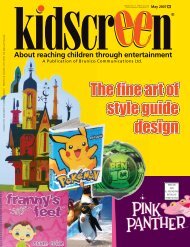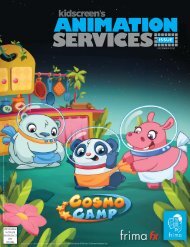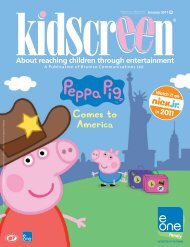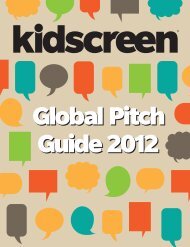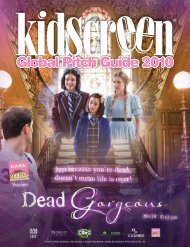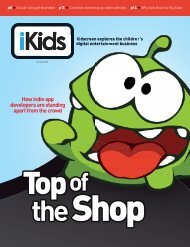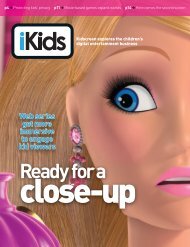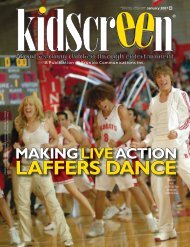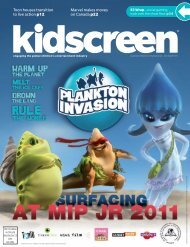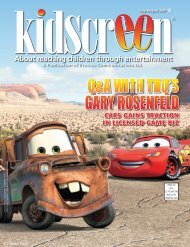download a PDF version - Kidscreen
download a PDF version - Kidscreen
download a PDF version - Kidscreen
You also want an ePaper? Increase the reach of your titles
YUMPU automatically turns print PDFs into web optimized ePapers that Google loves.
The Riki Group is<br />
re-working its hit<br />
series Kikoriki for an<br />
international audience<br />
18 May/June 2012<br />
Several factors are making the future of Russian studios<br />
appear brighter. Children’s programming now has<br />
more spots on TV in Russia, the quality of animated features<br />
coming out of Moscow and St. Petersburg is gaining<br />
notoriety, and a handful of treaties (including ones<br />
with France, Canada, Italy, Bulgaria and Germany) have<br />
paved the way for the country’s studios keen on forging<br />
global co-productions. But what’s really catapulting the<br />
Russian animation industry onto the world stage is new<br />
state funding, which over the last few years has put an average<br />
of US$50 million annually into animated projects<br />
produced in the country.<br />
“Last year, funding for animation grew by more than<br />
250%, and this year it has increased by another 150%,”<br />
says Ilya Popov, The Riki Group CEO and head of RAFA.<br />
So far, more than 30 animation companies and 100 individual<br />
animation professionals have joined the association.<br />
Popov expects that number to grow to 70 companies<br />
and 300 individuals by the end of this year, and<br />
she plans to eventually include organizations connected<br />
to the industry, including distributors, interactive fi rms<br />
and broadcasters.<br />
Making the scene<br />
Among the companies at Annecy will be Moscow-based<br />
Wizart Animation. Business development director Olga<br />
Sinelshchikova says the studio, which employs 150, has<br />
received funding for its steroscopic 3D animated feature<br />
The Snow Queen. Set for release in early 2013, the company<br />
is shopping the pic at the Cannes Film Festival and will be<br />
taking it to Annecy. Besides The Snow Queen, Sinelshchikova<br />
says Wizart will also by vying for more funding to make<br />
several animated TV projects, including one international<br />
co-production that it will sink its teeth into this year and<br />
four other series in development. She expects to announce<br />
at least one partnership at MIPCOM in October. “Our strategy<br />
for international sales is to fi nd strong partners, territory<br />
by territory, in order to establish long-term relationships,”<br />
says Sinelshchikova.<br />
Pennsylvania-based Michael Mennies, director of international<br />
at St. Petersburg’s The Riki Group, has been<br />
working directly with Russian production companies for<br />
more than 15 years. He’s seen the evolution of Russian animation,<br />
especially in the feature fi lm market. But in the TV<br />
space, he says Soviet-era series Goodnight Kids! (Spokoynoy<br />
nochi, malyshi!)—which airs nightly at 8 p.m. and pulls in<br />
up to seven million viewers per airing for pubcaster Russia<br />
1—has been a stalwart platform for launching toons. The<br />
program has a unique six-minute slot embedded within<br />
each episode that’s used to air new shows. In fact, The<br />
Riki Group’s fl agship cartoon Kikoriki (Smesharki) made its<br />
debut there in 2004. The company is now re-jigging the<br />
program for the international market.<br />
“There is a delicate balance between staying loyal<br />
to the brand and recognizing that the international<br />
market might want something different,” says Mennies.<br />
Besides its unusual six-minute format that’s been<br />
tailored for Goodnight Kids!, Kikoriki’s pacing is slower<br />
than similar international shows and it’s been scripted<br />
to reach a broad age range, because of Goodnight Kids’<br />
co-viewing audience. So Mennies is working with a<br />
US writing team to tighten up scripts, customize storylines<br />
and humor to serve a core kid audience, and<br />
remove local references.<br />
Creating Russian shows that can be formatted for distribution<br />
internationally is just one tack The Riki Group is taking.<br />
The other is developing international shows from the<br />
ground up. Qumi Qumi, a 26 x 11-minute Flash-animated<br />
series, is one such project Mennies is helping develop directly<br />
for the global market. With the help of state funding, the<br />
company is producing a pilot, in time for MIP Jr. in October.<br />
Partnering strategies<br />
“My advice to companies outside of Russia is that it’s<br />
helpful to fi nd a local partner to help navigate the territory,”<br />
says Mennies. Nickelodeon, for one, looked to The<br />
Riki Group as a partner when it entered Russia in 2010<br />
with a localized 24-hour cable channel and a block on<br />
terrestrial broadcaster TNT. (TNT reaches 102 million<br />
people and, as of December 2011, had an 11.9% market<br />
share of kids age four to 15.) Nickelodeon also acquired<br />
channel distribution, digital media and program sales<br />
rights for Kikoriki across Central and Eastern Europe (excluding<br />
Russia), the Middle East, Africa and Asia.<br />
“As we started building up our presence in Russia,<br />
we spent some time understanding who the local players<br />
are,” says Nicholas Walters, head of Nickelodeon/<br />
Viacom Russia. He says besides airing Kikoriki outside<br />
of Russia, the Nickelodeon programming sales team<br />
helps distribute the show internationally. (And last year,







